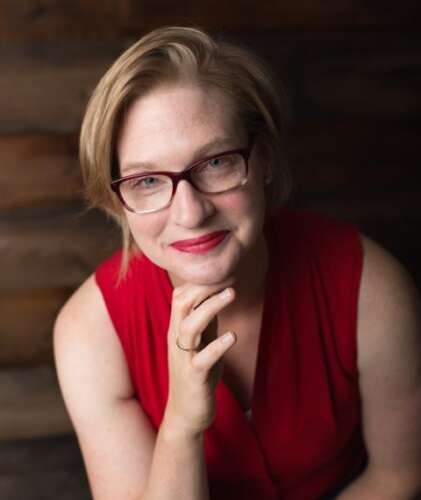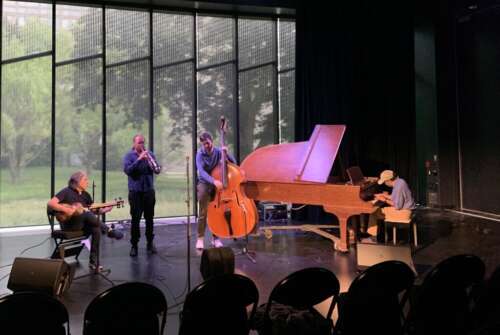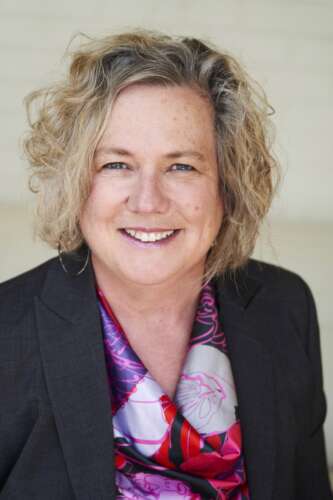Bridging the fields of music, art and theatre with health care, the University of Guelph is launching a Bachelor of Creative Arts, Health and Wellness (BCAHW), the first program of its kind in Canada.
U of G will welcome the program’s first cohort in the fall of 2024, making the interdisciplinary offering available at the undergraduate level, meeting a need identified by the World Health Organization in 2019 that declared the arts should play an increasingly critical role in health and wellbeing practices.

“It is a testament to U of G’s commitment to comprehensive education and being a comprehensive institution, that we have been able to create an interdisciplinary program like this,” says Dr. Kimberly Francis, professor of music in the School of Fine Art and Music and director of Interdisciplinary Programs in the College of Arts.
“This will transform our arts programs at U of G as well as transform health care.”
The four-year honours degree will enable students to explore artistic, psychological and therapeutic components of the creative arts and their connections to health care and human wellness. Students will enter the program pursuing an artistic major in music, theatre studies or studio art and combine that knowledge with required courses in psychology and core courses that specifically explore connections between the arts and human wellness.
Students’ training will be grounded in principles of inclusivity, learning how to maintain anti-oppressive health care practices. People are interested in careers in the arts and health because they are a safe space, Francis says, to tap into expressive needs and find healing.
Barbara Salsberg Mathews, a professional mime artist who studied in Paris, France, will teach a course exemplary of what to expect from the program, based on techniques she developed using mime as a therapeutic tool to help her Parkinson’s disease diagnosis.
“This course is an opportunity to train students to become fluent in mime and in turn, help train people with movement disorders how to override many annoying symptoms,” Salsberg Mathews says.
“Mime provides practical tools that can immediately be put into practice,” she explains. “It helps retrain the brain by using fine and large motor skills, imagery and motor memory. Repetition and mindfulness are used in creating mime illusions.”
Pandemic lessons inform modern health care approach
There can be a stigma around the arts of impracticality, but U of G’s program celebrates the rigour and flexibility of this area of study, Francis says. “I really think we’re going to find a lot of people interested in this type of training.”

The program prepares graduates to pursue careers in counselling and therapy, health care and medicine, education, community outreach and advocacy and social work, or continue their studies in graduate programs in music, drama or art therapy, psychology, or medicine.
The pandemic, says Francis, revealed the shortcomings of current health care structures. It was art and its healing power that helped many through, reminding people of the impact of creativity on one’s sense of health.
Increased research across the country has led to more trained professionals bridging the divide between the two fields, and Francis says there is an openness now to incorporating the arts into how we manage our health and wellbeing. “This is what our health care system desperately needs right now. It can help us economically, help people heal, help expand what health care can look like.”
Designing the program, the College of Arts worked with an advisory board, many of whom were proud alumni and established practitioners. They also worked with students whose support was the impetus for its creation.
“We are training folks who will be fluent in the qualitative, the quantitative, and the emotive,” Francis says. “There is power in combining these languages. These students are going to be very important voices in the future of Canadian health care.”
Students will graduate with research, practitioner and artistic skills, enabling them to think about mental health more productively, Francis points out. Four years of core training, including experiential learning opportunities with professional practitioners, will better position them for success in their respective fields.
A vanguard of the creative arts and health and wellness

The newly renovated Arts Research Centre (ARC) will play a pivotal role in the program, with its flexible, expandable, adaptable spaces that include a 140-seat black-box theatre, a 120-seat recital hall and a 130-seat performance lab for research in improvisation.
“It could not be a better facility for what we envision for this program,” Francis says.
Along with the ARC, new faculty whose core research is in creative arts, health and wellness will offer fresh perspectives to bring the program to life, Francis says.
“We are committed to being at the vanguard of this area of inquiry.”
Dr. Samantha Brennan, dean, College of the Arts, says the program is an incredibly exciting one that really gets to the heart of U of G.
“It builds on the University’s significant strengths in the fine and performing arts, connects the arts with psychology and advances U of G’s mission of improving life.
“The Bachelor of Creative Arts, Health and Wellness is one of the first undergraduate degrees in Canada that will allow students to study connections between the creative and expressive arts and the fields of health and wellness,” Brennan says.
Contact:
Dr. Kimberly Francis
kfranc02@uoguelph.ca
